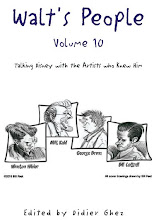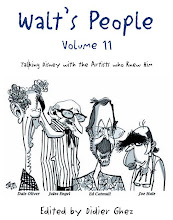This just in from Garry Apgar:
[“Elie Wiesel Visits Disneyland”
[“Elie Wiesel Visits Disneyland”
Nobel Prize-winning author and Holocaust survivor Elie Wiesel died
on Saturday, just five days after an article, “Elie Wiesel Visits Disneyland,” appeared
on the website of Tablet magazine.
The article, by Menachem
Butler, quotes extensively from a story about Walt Disney
and the original Magic Kingdom written and published by Wiesel almost exactly
sixty years ago.
Wiesel was a journalist at the time, and the story was published
in 1957, in Yiddish, in the New York-based Jewish newspaper Forverts (Yiddish for Forward). Titled in English, “A Visit to
the Wonderful Disneyland,” the piece was primarily a report on a visit by Wiesel
to the park and his response to the experience. In the story, as translated by
Butler, Wiesel remarked:
“I don’t know if a Garden of Eden
awaits adults in the hereafter. I do know, though, that there is a Garden of
Eden for children here in this life. I know because I myself visited this
paradise. I have just returned from there, just passed through its gates, just
left the magical kingdom known as Disneyland. And as I bid that kingdom
farewell, I understood for the first time the true meaning of the French saying
‘to leave is to die a little’ [partir,
c’est mourir un peu].”
Wiesel went on to say that “the person who created this land,
this universe, must be a genius, a rare genius.” He also recalled meeting
Disney in person in 1953 in Cannes, on the occasion of Walt’s promotion to the
rank of Officier in the French Legion
of Honor. In an interview with Disney, Wiesel said: “The whole world loves you;
your children’s films have brought you honor, renown, and anything one could
wish for.” He then asked: “What is your goal? What do you want—what would you
want—to achieve with your film work?”
“Disney thought for a bit,” Wiesel said, “fixing his large eyes
on a far off, invisible point in space, and answered: ‘Childhood. The goal of
my work has always been to awaken a sense of youth in men, in adults.
Because—the best part of man’s life is his childhood.’”
Neither then, nor later in life (so far as I know), did Wiesel
ever suspect, much less accuse, Walt Disney of being anti-Semitic. That alone
should put that toxic canard permanently to rest. It won’t, of course. In the
lengthy comments section following a post by Amid Amidi in 2011 on the Cartoon Brew website, some of the more
ignorant participants in the “conversation” couldn’t even spell “anti-Semitic”
correctly.
One of them even wrote “anti-semantic.” Oy vey.]























No comments:
Post a Comment